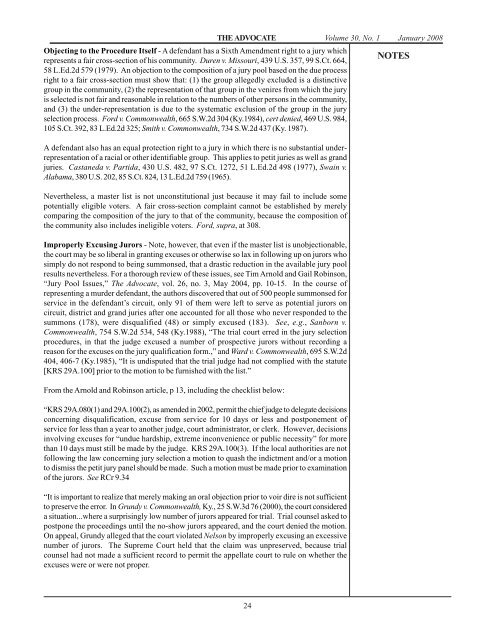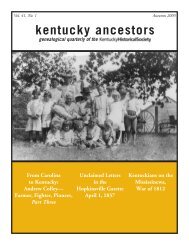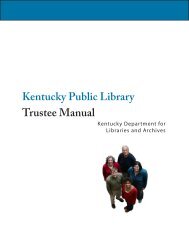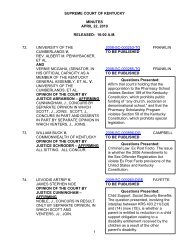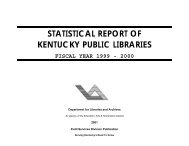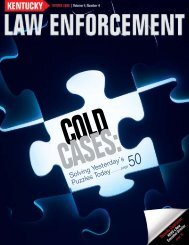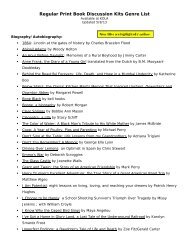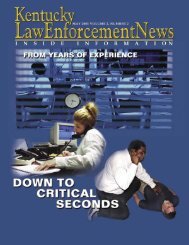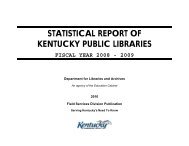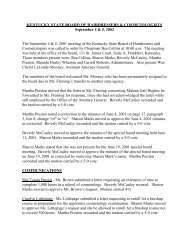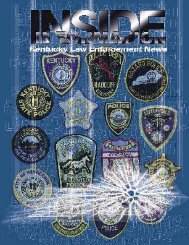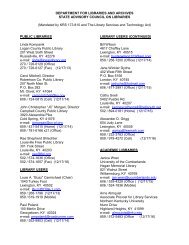Jan08 Advo.pmd - e-archives Home
Jan08 Advo.pmd - e-archives Home
Jan08 Advo.pmd - e-archives Home
Create successful ePaper yourself
Turn your PDF publications into a flip-book with our unique Google optimized e-Paper software.
THE ADVOCATE Volume 30, No. 1 January 2008<br />
Objecting to the Procedure Itself - A defendant has a Sixth Amendment right to a jury which<br />
represents a fair cross-section of his community. Duren v. Missouri, 439 U.S. 357, 99 S.Ct. 664,<br />
58 L.Ed.2d 579 (1979). An objection to the composition of a jury pool based on the due process<br />
right to a fair cross-section must show that: (1) the group allegedly excluded is a distinctive<br />
group in the community, (2) the representation of that group in the venires from which the jury<br />
is selected is not fair and reasonable in relation to the numbers of other persons in the community,<br />
and (3) the under-representation is due to the systematic exclusion of the group in the jury<br />
selection process. Ford v. Commonwealth, 665 S.W.2d 304 (Ky.1984), cert denied, 469 U.S. 984,<br />
105 S.Ct. 392, 83 L.Ed.2d 325; Smith v. Commonwealth, 734 S.W.2d 437 (Ky. 1987).<br />
A defendant also has an equal protection right to a jury in which there is no substantial underrepresentation<br />
of a racial or other identifiable group. This applies to petit juries as well as grand<br />
juries. Castaneda v. Partida, 430 U.S. 482, 97 S.Ct. 1272, 51 L.Ed.2d 498 (1977), Swain v.<br />
Alabama, 380 U.S. 202, 85 S.Ct. 824, 13 L.Ed.2d 759 (1965).<br />
Nevertheless, a master list is not unconstitutional just because it may fail to include some<br />
potentially eligible voters. A fair cross-section complaint cannot be established by merely<br />
comparing the composition of the jury to that of the community, because the composition of<br />
the community also includes ineligible voters. Ford, supra, at 308.<br />
Improperly Excusing Jurors - Note, however, that even if the master list is unobjectionable,<br />
the court may be so liberal in granting excuses or otherwise so lax in following up on jurors who<br />
simply do not respond to being summonsed, that a drastic reduction in the available jury pool<br />
results nevertheless. For a thorough review of these issues, see Tim Arnold and Gail Robinson,<br />
“Jury Pool Issues,” The <strong>Advo</strong>cate, vol. 26, no. 3, May 2004, pp. 10-15. In the course of<br />
representing a murder defendant, the authors discovered that out of 500 people summonsed for<br />
service in the defendant’s circuit, only 91 of them were left to serve as potential jurors on<br />
circuit, district and grand juries after one accounted for all those who never responded to the<br />
summons (178), were disqualified (48) or simply excused (183). See, e.g., Sanborn v.<br />
Commonwealth, 754 S.W.2d 534, 548 (Ky.1988), “The trial court erred in the jury selection<br />
procedures, in that the judge excused a number of prospective jurors without recording a<br />
reason for the excuses on the jury qualification form.,” and Ward v. Commonwealth, 695 S.W.2d<br />
404, 406-7 (Ky.1985), “It is undisputed that the trial judge had not complied with the statute<br />
[KRS 29A.100] prior to the motion to be furnished with the list.”<br />
From the Arnold and Robinson article, p 13, including the checklist below:<br />
“KRS 29A.080(1) and 29A.100(2), as amended in 2002, permit the chief judge to delegate decisions<br />
concerning disqualification, excuse from service for 10 days or less and postponement of<br />
service for less than a year to another judge, court administrator, or clerk. However, decisions<br />
involving excuses for “undue hardship, extreme inconvenience or public necessity” for more<br />
than 10 days must still be made by the judge. KRS 29A.100(3). If the local authorities are not<br />
following the law concerning jury selection a motion to quash the indictment and/or a motion<br />
to dismiss the petit jury panel should be made. Such a motion must be made prior to examination<br />
of the jurors. See RCr 9.34<br />
“It is important to realize that merely making an oral objection prior to voir dire is not sufficient<br />
to preserve the error. In Grundy v. Commonwealth, Ky., 25 S.W.3d 76 (2000), the court considered<br />
a situation...where a surprisingly low number of jurors appeared for trial. Trial counsel asked to<br />
postpone the proceedings until the no-show jurors appeared, and the court denied the motion.<br />
On appeal, Grundy alleged that the court violated Nelson by improperly excusing an excessive<br />
number of jurors. The Supreme Court held that the claim was unpreserved, because trial<br />
counsel had not made a sufficient record to permit the appellate court to rule on whether the<br />
excuses were or were not proper.<br />
24<br />
NOTES


